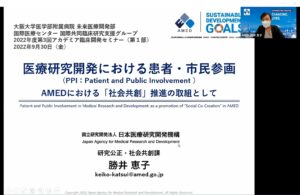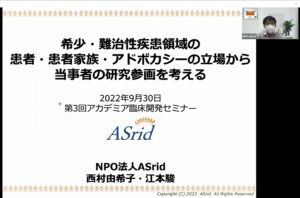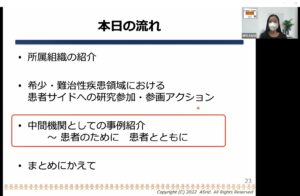(3rd Seminar Report) Academia Clinical Development Seminar
Part I "Patient and Public Involvement in medical research and development: as a promotion of "social co-creation" in AMED "
Part II "Patient and Public Involvement from the perspective of patients, families, and advocates in the area of rare and intractable diseases"
On September 30, 2022, we held the 3rd Academia Clinical Development Seminar online, inviting Dr. Keiko Katsui from Japan Agency for Medical Research and Development (AMED), and Dr. Yukiko Nishimura and Dr. Shun Emoto from ASrid.
In Part I, Dr. Katsui spoke about PPI in medical research and development: a promotion of "social co-creation" in AMED, and in Part II, Dr. Nishimura and Dr. Emoto spoke about PPI from the perspective of patients, families, and advocates in the area of rare and intractable diseases.
Part I: PPI in medical research and development - as a promotion of “social co-creation” in AMED –
 First of all, Dr. Katsui explained the basic concept of PPI by AMED.
First of all, Dr. Katsui explained the basic concept of PPI by AMED.
In AMED, PPI is defined as "PPI in medical research and clinical trials processes" and the AMED promotes PPI based on the philosophy of "Produce research results that are more useful for patients and the public," "Promote implementation of medical research and clinical trials, smoothly " and "Contribute human subject protection (reduce risk)", she said.
She also said that the significance of incorporating perspectives from patients and the public in medical research and development is that the "knowledge and experiential" of patients and the public can provide perspectives that researchers would never be able to recognize.
Second of all, she mentioned that PPI is a forum for dialogue between researchers, patients and the public, and it is neither a place to recruit research participants nor a place to enlighten and publicize research. Conflict of interest management and confidentiality issues are important for PPI, she said.
Part II “PPI from the perspective of patients, families, and advocates in the area of rare and intractable diseases”


First, Dr. Emoto explained that ASrid is a non-profit organization for multi-stakeholders in the rare and intractable diseases, including patients and their families, medical institutions, governments, industries, and academia and that it works to utilize the patients’ voices as Patient Reported Outcome (PRO)* in a broad sense.
*PRO: the concept of utilizing the perceptions, evaluations, and values known only to patients and their families in medical care and living.
Secondly, as a characteristic of research and development in the rare and intractable diseases, he said that it is difficult for researchers to fully grasp the current situation and to recruit subjects because of the small number of patients, medical specialists, and previous studies. Therefore, it is important to collect information on the experiences of patients and their families, as well as information aggregated by the patient network, and to collaborate with each other, he said.
As a case study conducted by ASrid for patients, Dr. Nishimura explained about the "Image Survey on Clinical Trials" targeting patients with intractable diseases and related people.
The survey showed that respondents who had never participated in a clinical trial tended to give negative answers, and based on this finding, it is necessary to provide correct information to those who have never participated in a clinical trial and to be close to patients to support them, she said.
As another example, she explained that ASrid reviewed the ICF (Informed Consent Form) together with patient groups and fed them back to researcher side (ICF authors) to improve the ICF, thereby enabling patients to participate in research planning.
Thus, it was very important to understand the needs of each stakeholder and appropriately collect, analyze, and provide information, and to communicate patients’ issues and information to the relevant parties, she said.
As mentioned above, this seminar was a great success, with speakers talking about PPI and a lively Q&A session with numerous participants.
The next seminar will be held on Friday, November 18, 2022, with Prof. Masaharu Mori from Institute for Open Innovation, Osaka University.
We look forward to seeing you at the next meeting.


